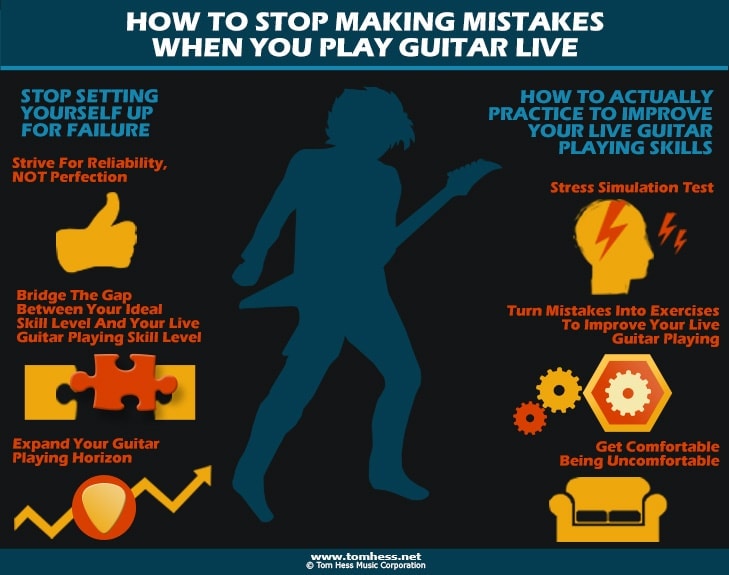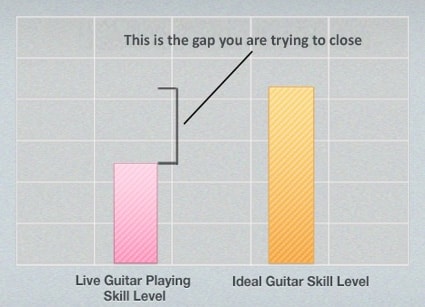Emotion To Any Guitar Lick

EMAIL TO GET ACCESS
By submitting your info, you agree to send it to Tom Hess Music Corporation who will process and use it according to their privacy policy.
That said, when you practice guitar for live guitar playing, there are several things you MUST learn to do and think about to ensure that you are ready to perform well and have fun doing it.
Stop Setting Yourself Up For Failure
When practicing to play guitar live, the first thing you have to do is readjust your expectations. Most guitarists think that the goal is to make “zero” mistakes during live guitar playing. This is the wrong mindset to have. If you expect 100% perfection during live playing, you will always feel like a failure if/when you make even a small mistake (which inevitably happens to anyone when playing live). Yes, even the very best guitar players make mistakes on stage (and most people in the audience can never tell - even those sitting in the front row). However, you obviously should NOT settle for sloppy guitar playing or stop caring about mistakes completely. The first extreme makes you overly anxious about your guitar playing, and that anxiety CAUSES mistakes to happen. Conversely, not caring about mistakes entirely, ensures that your guitar playing will always be sloppy when playing live.
Emotion To Any Guitar Lick

EMAIL TO GET ACCESS
By submitting your info, you agree to send it to Tom Hess Music Corporation who will process and use it according to their privacy policy.
Goal #1. Strive For Reliability - NOT Perfection
Many guitarists struggle with live guitar playing because their playing is unpredictable and unreliable. Sometimes they play very well, but other times their performance is a complete disaster. Your first goal needs to be to eliminate this inconsistency and learn to play at a reliable level, every time, without drastic fluctuations in performance. Fact is, being able to play guitar with 85-87% accuracy every single time you play live is WAY more impressive than playing with 99% accuracy one time, then with 72% the next time, 86% the next time and 68% the time after that. Striving for consistency/reliability in your guitar playing is important, because it allows you to work on the second goal…

Goal #2. Bridge the Gap
As a guitar player looking to improve your live guitar playing, you have 2 different skill levels to keep track of: your ideal skill level and your live guitar playing skill level. Your ideal skill level is measured by you playing guitar in optimum conditions (in your bedroom, while sitting down, with no distractions, with perfect temperature in the room, etc.). Your live guitar playing skill level is measured by your abilities when you are in a less-than-optimum situation (on stage, with blinding lights in your face, lots of distractions, loud music, room/venue temperature too hot or too cold, playing while walking around, etc.). So your second goal when practicing for live guitar playing, is to bridge (minimize) the gap between these 2 levels. This does NOT mean that you aim to make zero mistakes (as I wrote above) - it means a never-ending pursuit to get your live guitar playing skills as close as possible to your ideal skill level (more about HOW to do this below).
Realize that your live guitar playing will always lag “somewhat” behind your true maximum abilities in an ideal environment. That said, you can do A LOT to minimize the gap between the two and make them very close to each other. The image below is a good way to visualize what I explained above.

Goal #3. Expand Your Guitar Playing Horizon
You will improve your live guitar playing skills faster when you consistently work on increasing your OVERALL maximum abilities as a guitarist. This point seems extremely obvious when you first read it, but you must understand 3 crucial reasons why doing this specifically helps your live guitar playing:
- Improving your maximum abilities as a guitar player has some immediate carryover into your ability to play guitar better live (although that carryover is limited). I discuss this point (and how to take maximum advantage of it) in detail in this free eCourse on doubling your guitar speed.
- Despite some amount of immediate carryover, improving your maximum abilities on guitar will make you more aware of the gap between your “ideal” skill level and your “live guitar playing” skill level. This increases the positive pressure you feel to practice guitar and make your guitar playing better while performing (using the process I will describe below).
- Your live guitar playing will never be “better” than your maximum skill level. So if you want to continuously get better at playing live, you must give yourself something to “strive” for. The best way to do this is to set a new standard in excellence by simply learning to play guitar better in an ideal environment.
Now, let’s talk about how to actually PRACTICE guitar to improve your live guitar playing skill level:
 How To Play A Better Live Show
How To Play A Better Live ShowLearn 5 easy ways to play better
a better live show with your band.
 Stage Fright Remedy For Guitarists
Stage Fright Remedy For Guitaristsif you're suffering from stage fright, you must read this article.
 Develop Better Stage Presence
Develop Better Stage PresencePlay unforgettable live shows byusing these stage presence tips.
Step 1: Stress Simulation Test
Practicing guitar effectively for live performance requires a modified version of the approach needed to learn anything you want on guitar.
You must begin by taking the piece of music you intend to perform and putting it through a “stress simulation test”. This means you must simulate live guitar playing in when you practice guitar as closely as possible, by using stress variables, like this:
- Practice guitar in front of a bright light (or in darkness) to simulate what it’s like to play on a real stage
- Practice guitar while standing up, moving around, walking, running or jumping
- Practice guitar with distractions around you
- Practice guitar around other people (even if it’s just friends and family)
- Practice guitar through unfamiliar equipment (guitars and amps)
- Practice guitar through unfamiliar amp settings (where you can’t dial in your favorite guitar tone)
- Practice guitar outside
- Practice guitar when your fingers are cold
- Practice guitar when your fingers are hot and sweaty
- Practice guitar without hearing yourself (and record it so you can listen back to what it actually sounded like)
- Etc.
Step 2: Turn Mistakes Into Exercises To Improve Your Live Guitar Playing
Your next step is to identify specific parts of the music that fall apart under one or more of the stress elements above. These are parts that are most likely to be the source of mistakes when you perform live. For instance, you may find that playing in the dark makes your fretting hand position shifts inconsistent and unreliable, or that you cannot sweep pick cleanly when playing on an amp setting that doesn't have your favorite tone. List all such problem spots (and the stress variables that cause them) on paper or in a computer file.
You now have a list of “exercises” that will improve your live guitar playing, and you are ready for step 3:
Step 3: Get Comfortable Being Uncomfortable
You’ve now isolated parts of the music that fall apart under a specific element of live guitar playing stress. Your next step is to drill them over and over in that same real-life context until they start feeling easy. For example, if you notice that a certain lick in a solo always falls apart when you play it standing up - practice guitar by repeating it over and over while standing until it feels easy. Do this with all the other problems you identified and watch your guitar playing start to feel a whole lot more reliable “when it really counts" - during live guitar playing.
The good news is that nothing about this process is physically challenging. After you go through it a few times, you will see how simple (and powerfully effective) it is. This will help you to build more confidence and reduce anxiety about live guitar playing - which will in turn help improve your performance skills.
Tip: you will have an easier time fitting this approach into your practicing (and balancing it with working on other areas of your guitar playing), if you use a highly effective guitar practice schedule.
Adjusting your focus and practicing guitar using the above process will allow you to be completely at home on stage. Instead of feeling afraid of live guitar playing, you will start putting on performances that YOU feel great about. Because of this, your audience will feel great about them too. It doesn’t matter how many people are watching you, having the skills and confidence needed to be a successful performer will help you transition from being a “guitar player” to becoming a real musician.
To learn even more about becoming a better guitar player, take this free mini course about reaching your musical goals.
Learn how to master your guitar playing by taking guitar lessons online.
 | Forward this article to your friends |
